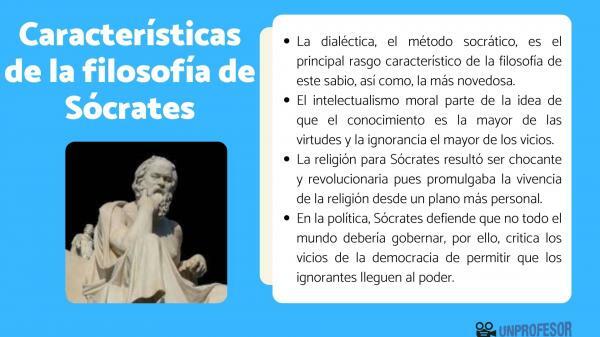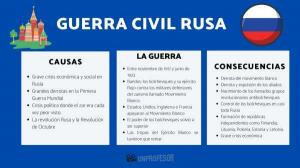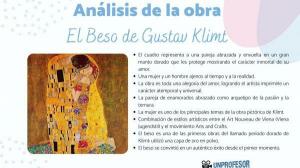FEATURES of the most important SOCRATES philosophy [with VIDEO!]

In a teacher's lesson we will talk about characteristics of Socrates' philosophy (470-399 a. C.), father of western philosophy and whose philosophy marked a before and after in history. It is considered that with him begins a new way of thinking about big ethical dilemmas (the good, politics, religion, justice, virtue ...) from the logos / reason and not from the mythos / mythology.
Socrates laid the foundations of philosophy and, although he didn't write anything, influenced his disciples so much that his legacy has come down to us through the works of Plato (424-347 a. C.) or Xenophon (425-386 a. C.). If you want to know more about Socrates' philosophy and his characteristics, keep reading because in a PROFESSOR we explain everything to you.
Socrates was a classical philosopher that he broke with everything established and that he broke into the Classical athens, predominantly sophist (pre-Socratic), to question everything. Reason why he became a dangerous, annoying character (known as the “gadfly of Athens”) and that he won numerous enemies, which led to his death.
Socrates was born in Athens around the year 470 BC. C. in the bosom of a humble family (his father was a sculptor and his mother was a midwife), which is why he received a basic education and, before standing out as a philosopher, worked as a bricklayer and fought in the Battle of Potidea (432 BC) C.). However, he also stood out as a disciple of the philosopher Arquelao (S.V a. C.) and, little by little, he excelled as a speaker, creating around a small group of disciples, among which stood out: Plato, Xenophon, Aristipo, Fedon, Euclides or Aristipo. From which, great currents such as Stoicism, Cynicism or Epicureanism will emerge.
Similarly, it should be noted that Socrates he revolutionized teaching: he did not charge for his classes, his lessons were aimed at few individuals, and his method was fully practical. That is to say, for him, the student had to be an active subject, had to be a participant in their own learning and not limit themselves to obtaining knowledge in a theoretical way, as they promulgated the sophists.
At the same time, he also became an awkward character for the tyranny of Critias and in the year 399 a. C. he was sentenced to death for corrupting the youth, for impiety (not believing in the gods of the polis) and trying to introduce other gods. Undoubtedly, his trial was a political trial and, for refusing to recant, he was sentenced to die by ingesting a glass of hemlock. Despite the fact that his friends had everything prepared for his escape, he refused, saying: "I would rather die in Athens than live in exile."
Socrates accepted his condemnation, and at the age of 71, the one who, according to the Oracle of Delphi, died the wisest man in Greece. However, his legacy did not, for on his death the Socratic School and Platonic Academy, reaching us the greatest contributions of him to philosophy: politics, dialectics, moral intellectualism, inductivism, rationalism or axiology.
Socrates' philosophy has been defined as the cornerstone and the germ of western philosophyl, due to his great contributions to almost all fields. Moreover, his own thought marked a before and after, because before him philosophy was defined as pre-Socratic philosophy. In addition, his contributions were of such importance that, to this day, we can study the main characteristics de the philosophy of Socrates.
The dialectic, the Socratic method
The dialectics It is the main characteristic feature of the philosophy of this sage, as well as the most innovative. This method is based on a dialogue (path to reason) between two interlocutors and the purpose of which is for one of them to help find truth or knowledge to the other Through a series of questions that lead us to think, open our minds, arouse curiosity, incite debate and free ourselves from preconceptions. Well, according to Socrates, knowledge is something inherent in us that we have forgotten, that we only have to remember and find it through dialectics. Which is divided into two phases:
- The irony: The teacher raises a topic to be debated by the student, making him believe that he knows them (exalting it) and the teacher does not. Thus, the teacher begins by humbly asking and refutes all with more questions.
- The maieutics (maieutike = art of helping to give birth): It helps us to get our knowledge out of our psyche and to discover that our idea about things is wrong. It helps us to give birth to knowledge.
Moral intellectualism
The moral intellectualism it is another of the characteristics of Socrates' philosophy. Part of the Socratic idea that tells us that knowledge is the greatest of virtues and ignorance the greatest of vices and, therefore, for our protagonist evil is the absence of knowledge of good and the fruit of ignorance. Thus, the person who acts badly is not out of evil, but out of ignorance and nobody does evil knowingly. Therefore, if you teach the individual who does evil what good is, he will correct him and do good, since he is a victim of ignorance.
In this sense, moral intellectualism is characterized by trying to make a moral or ethical reform from reason and through knowledge, because it rationalizes good (knowledge) and evil (ignorance).
Finally, this intellectualism leads us to another of the characteristics of Socratic philosophy, the Socratic fallacy. The one that establishes that it is not true that the absence of knowledge leads us to do evil, since as already Aristotle affirmed: knowing what good is does not imply that we are going to do it, because knowing what it is we can do the wrong.
Religion according to Socrates
Socrates' idea of religion turned out to be shocking and revolutionary for his contemporaries, he promulgated the experience of religion from a more personal and intimate plane, internalizing religion and moving the public sanctuary within us, the sanctuary of consciousness. In this sense, Socrates, speaks to us of the daimon= your god / conscience: our inner self, your inner voice that tells you what to do and the one that mediates between the gods and the human being.
However, this does not mean that Socrates was a believer, but that he tries to reach a dialogue between official and personal religion, in addition to understanding religion from reason and philosophy.
Politics according to Socrates
We finish this review of the main characteristics of Socrates' philosophy by saying that the philosopher establishes that politicians must be specialists in this matter. Just as a doctor must know about medicine, the politician who runs a polis must be an expert in justice, good and virtue. Therefore, from this thesis, not everyone should rule and, therefore, criticizes the vices of democracy= allow the ignorant to come to power. However, it states that you must be loyal to the system and respect his laws.



